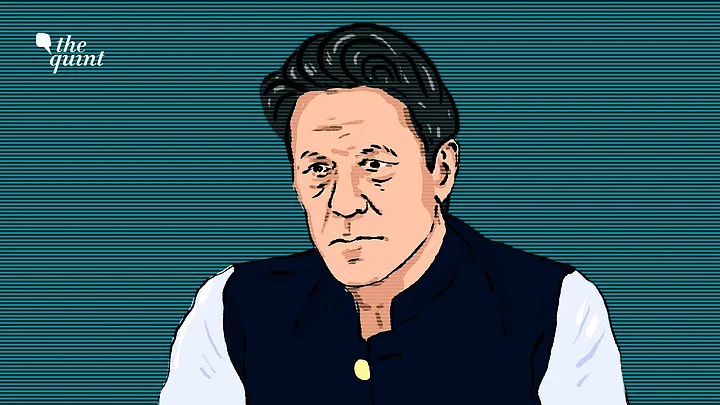The National Assembly session to debate the no-confidence motion against Pakistan PM Imran Khan was adjourned to 3 April, minutes after it began on Thursday, 31 March.
Meanwhile, backdoor talks between Imran Khan's party Pakistan Tehreek-e-Insaf (PTI) and the joint Opposition are currently underway to dissolve the Lower House of the National Assembly.
The motion was moved by Leader of the Opposition Shahbaz Sharif under Article A-95 of the country's constitution.
Additionally, according to Federal Minister for Information & Broadcasting Fawad Hussain, the prime minister will address the nation on Thursday night.
Khan's tenure as prime minister might possibly be coming to an end, with the Muttahida Qaumi Movement-Pakistan (MQM-P) formally announcing on 30 March that it was exiting the coalition government led by his party, the Pakistan Tehreek-i-Insaf (PTI).
The breaking of ranks occurs in the backdrop of the no-trust vote against Prime Minister Khan, that is scheduled to take place on 3 April.
Additionally, MQM-P leaders Farogh Naseem (federal minister for law) and Aminul Haque (minister for information technology and telecom) have quit the Khan government's Cabinet.
The switch is important because the MQM-P has seven members in Pakistan's National Assembly, a large number given the fact that Khan's coalition government has a wafer-thin majority in a house of 342 seats (the magic number is 172).
The Numbers Game
The National Assembly of Pakistan has 342 seats for elected officials known as Members of the National Assembly (MNAs).
Within Pakistan's electoral system, a political party must secure at least 172 seats to win a majority. If not the case, a government can be formed with a coalition consisting of 172 or more MNAs from different parties.
In 2018, when Imran Khan won the general election, his government's coalition consisted of 176 seats: The break-up of these is as follows:
Pakistan Tehreek-e-Insaf: 151
Muttahida Qaumi Movement - Pakistan: 7
Pakistan Muslim League (Q): 3
Balochistan Awami Party: 5
Balochistan National Party (Mengal): 4
Grand Democratic Alliance: 3
Awami Muslim League (Pakistan): 1
Jamhoori Wattan Party: 1
Mohammad Aslam Bhutani (independent): 1
Total: 176
As Khan's allies rebelled against him, the above numbers have now been reduced to the following:
Pakistan Tehreek-e-Insaf: 155
Pakistan Muslim League (Q): 4
Grand Democratic Alliance: 3
Balochistan Awami Party: 1
Awami Muslim League: 1
(Zubaida Jalal is the only one from the BAP MNAs who won't vote against Khan)
Total: 164
The opposition now, according to the numbers provided by Dawn, looks like this:
Pakistan Muslim League (N): 84
Pakistan Peoples Party: 56
Muttahida Qaumi Movement - Pakistan: 7
Muttahida Majlis-e-Amal: 15
Balochistan National Party (Mengal): 4
Balochistan Awami Party: 4
Pakistan Muslim League (Q): 1
Awami National Party: 1
Jamhoori Wattan Party: 1
Independents: 3
Total: 176
The total (164+176) comes to 340, which is two short of 342. This is because the status of some PTI dissidents is unclear, along with the legality of their votes in the vote of no-confidence.
These numbers help us understand why the seven seats of the MQM-P were so crucial to Khan's coalition government.
If the party had not broken ranks with the PTI-led coalition, then the government would have 171 seats, (one short of the magic number) and the opposition would be reduced 169 (three short).
The whole outcome would then boil down to the dissidents within the PTI, but it would put Khan in a much more comfortable position than he is in at the moment.
Recap
Pakistan's opposition in parliament has blamed Khan’s government for the economic crisis and the rising inflation in the country.
On 8 March, a motion of no confidence was submitted to the National Assembly Secretariat by opposition parties.
It was tabled in parliament on 28 March, with the vote scheduled for 3 April.
Khan had claimed a few days ago that he has support of the military, but a Pakistan Army spokesman last week told Pakistani media that the military will remain neutral.
"Only animals are neutral," Khan had responded while addressing a huge rally in Islamabad, the capital of Pakistan.
Meanwhile, MQM-P's party convener Khalid Maqbool Siddiqui, who made the announcement of the party joining the opposition, called it a "historic moment", claiming that the party has "prioritised Pakistan's interests over all individual interests."
"I expect that this time we can [strive for] a democracy whose effects can reach the common people of Pakistan. We have joined you (the opposition) on this journey with these expectations. We have no individual or party benefits. Every clause of our agreement is for the common public of Pakistan."Khalid Maqbool Siddiqui for MQM-P, quoted by Dawn
PPP chairman Bilawal Bhutto Zardari stated on 30 March that Leader of the Opposition Shahbaz Sharif, the brother of former prime minister Nawaz Sharif, will become the next prime minister of the country.
To add to the drama, PTI leader Faisal Vawda "revealed" on the same day that "a plan" was being hatched to assassinate the prime minister.
To understand Pakistan's political crisis better, read Samarth Grover's detailed explainer here.
